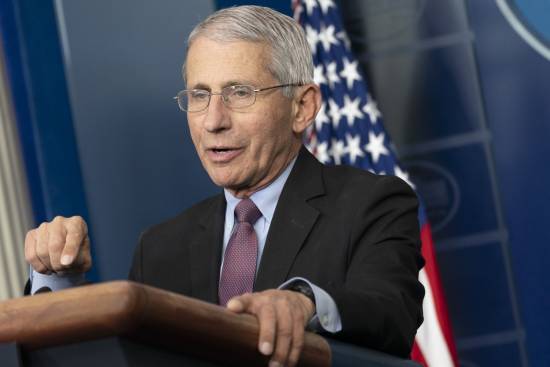Fauci: COVID-19 vaccines could 'ultimately help us to develop a successful and highly effective HIV vaccine'
- Dr. Anthony Fauci got his start as a public health expert during the HIV/AIDS epidemic in the 1980s.
- Fauci told Today he never wanted to become director of the National Institute of Allergy and Infectious Diseases (NIAID), but was motivated by the lack of attention the HIV/AIDS crisis received.
- He believes there is much to be learned from the COVID-19 vaccines that could possibly lead to a vaccine for HIV.
Dr. Anthony Fauci, director of the National Institute of Allergy and Infectious Diseases (NIAID), is one of the nation's leading experts on the novel coronavirus pandemic. Nearly four decades before COVID-19 spread around the world, he tackled another deadly and less publicized epidemic.
Fauci told Today about his early career experience working as senior investigator for the National Institutes of Health, as the HIV/AIDS crisis hit in 1981. He became one of the country's lead HIV/AIDS researchers as the deadly epidemic took the lives of 700,000 people in the US.
"It was a particularly transforming time," he told Today. "I can remember very distinctly sitting in my office outside my lab in the clinical center hospital where I saw the first (report) describing the first five patients from Los Angeles with this curious new disease, with nobody knowing what was going on."
He spent much of his career trying to find solutions to the HIV/AIDS crisis, which motivated him to become director of the NIAID.
"I never really had any aspirations to be the director of the institute, but it was clear to me that we were not paying as much attention to infectious diseases in general, but specifically to HIV," he told Today.
HIV/AIDS research and treatment has grown rapidly since the 1980s
HIV/AIDS treatments have vastly improved since Fauci first learned of the virus in the 1980s.
In 2017, the Centers for Disease Control and Prevention stated people living with HIV, who have taken anti-viral medication regularly for at least six months, have undetectable viral loads, meaning they cannot pass it on to other people.
People looking to protect themselves from HIV also now have the option of taking pre-exposure prophylaxis (PrEP), a medication that greatly reduces the chance of someone contracting the virus through sex or sharing needles. According to the CDC, taking PrEP can reduce someone's chance of contracting HIV through sex by 99%.
Scientists have yet to develop a vaccine for HIV, but Fauci is hopeful. While HIV attacks the body differently than COVID-19, the process of developing vaccines for COVID-19 has taught specialists ways to reimagine vaccine development.
"Hopefully some of the things we've learned from the COVID-19 vaccines will ultimately help us to develop a successful and highly effective HIV vaccine," Fauci said. "So we're still hoping that that's going to come to pass."
Insider


